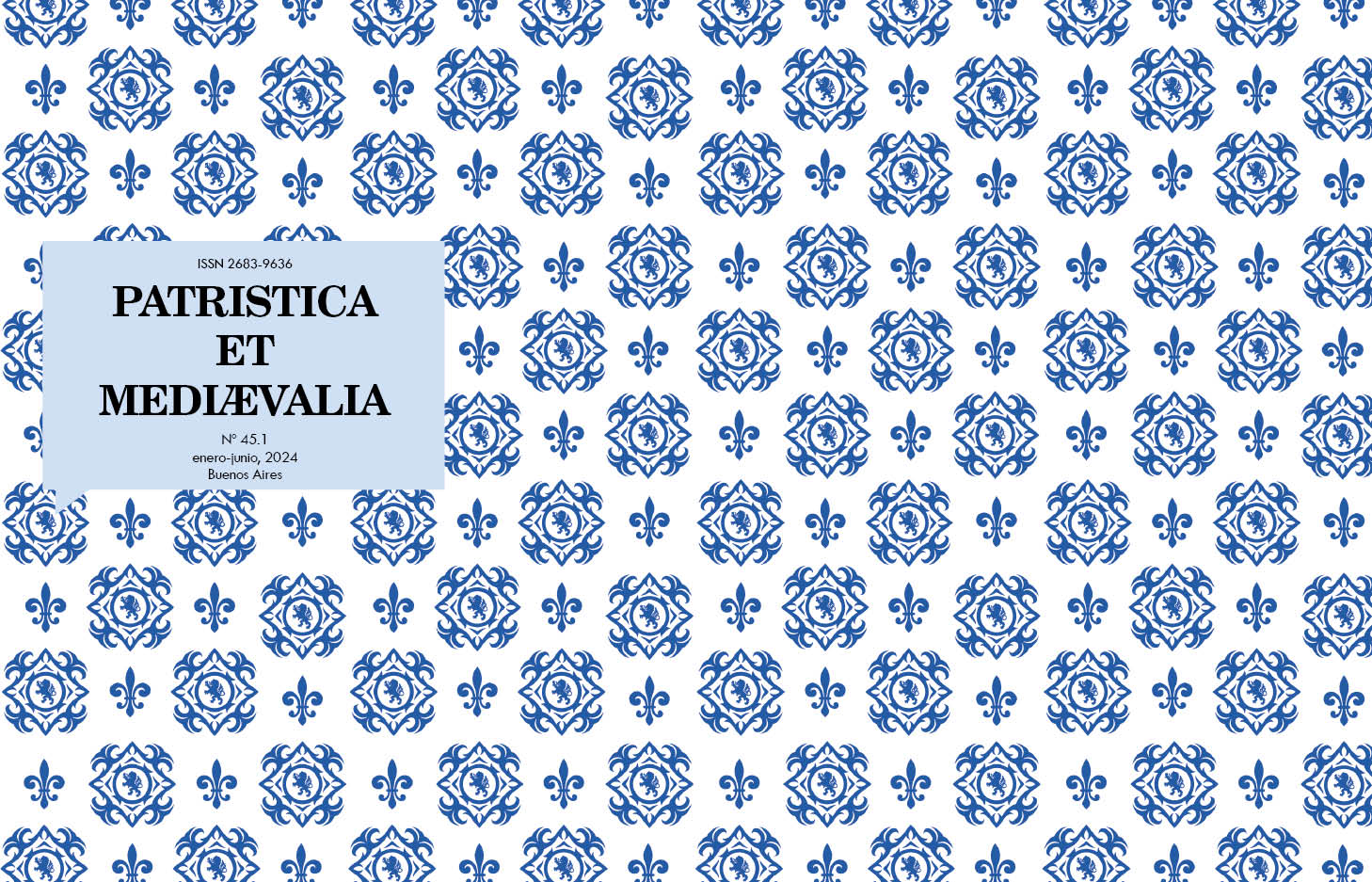Two Philosophies of Immanence. The Relevance of Meister Eckhart in the Phenomenology of Michel Henry
Abstract
The mystical thought of Meister Eckhart has a prominent place in the philosophy of Michel Henry, one of the most relevant French phenomenologists. He has carried out a profound radicalization of phenomenology, bringing all appearance back to a pure appearing, immanent and independent of transcendence, that is to say, of the horizon of the world. The hypothesis of this article is that Eckhartian mystical theology offers Henry the key conceptual elements to conceive and describe this pure appearing. To demonstrate this, the article will be organized as follows. In the first section, an introduction to the most important theses of Henry's philosophy will be offered. In the second section, it will highlight the concepts proper to Meister Eckhart's German work that are taken up by Henry in The Essence of Manifestation, his most important work, and examine what is the particular interpretation he made of them. In the third section, finally, the characteristic notes of phenomenology of life will be introduced and the link between the Eckhartian theory of generation and the Henryian theory of transcendental birth will be clarified. After this, we hope that it will be possible to observe how Eckhartian thought is present in all of Henry's work: from the most purely phenomenological moment, in which Henry tries to give subjectivity a strictly immanent phenomenality, to his last texts, in which the ultimate foundation is absolute Life, i.e. God, who reveals Himself to Himself, thus giving birth to the livings, structurally identical to Himself.Downloads
References
Cairns, D. (1976). Conversations with Husserl and Fink. La Haya: Nijhoff. (Phaenomenologica 66).
De Libera, A. (1999). Eckhart, Suso, Tauler y la divinización del hombre. Trad. Serrat Crespo, M. Madrid: Olañeta.
Depraz, N. (2001). “En quête d’une métaphysique phénoménologique: la référence henryenne à Maître Eckhart”. En: David, A. y Greisch, J. (eds.). Michel Henry, l’épreuve de la vie: actes du Colloque de Cerisy, 1996. París: Cerf, 255-280.
Dufour-Kowalska, G. (1973). “Michel Henry lecteur de Maître Eckhart”, Archives de Philosophie 36.4, 603-624.
Faggin, G. (1953). Meister Eckhart y la mística medieval alemana. Trad. Sella, E. Buenos Aires: Sudamericana.
Gottschall, D. (2013). “Eckhart’s German Works”. En: Hackett, J. (ed.). A Companion to Meister Eckhart. Leiden: Brill, 137-183.
Greisch, J. (2024). “To Live and Think without Why: Eckhart’s Affinities with Phenomenology”. En: Rivera, J. y O’Leary, J. S. (eds.). Theological Fringes of Phenomenology. Abingdon - Nueva York: Routledge, 181-190.
Heidegger, M. (1995). Phänomenologie des religiösen Lebens. Fráncfort del Meno: Vittorio Klostermann. (Gesamtausgabe 60).
Henry, M. (1994). “Phénoménologie de la naissance”, Alter 2, 295-312.
Henry, M. (2001). Encarnación: una filosofía de la carne. Trad. Teira, J, Fernández, G. y Ranz, R. Salamanca: Sígueme.
Henry, M. (2003). “Qu’est-ce que cela que nous appelons la vie? ”. En: Idem. Phénoménologie de la vie, vol. I: “De la phénoménologie”. París: Presses Universitaires de France.
Henry, M. (2004). Yo soy la verdad. Para una fenomenología del cristianismo. Trad. Teira, J. Salamanca: Sígueme.
Henry, M. (2005). Entretiens. París: Sulliver.
Henry, M. (2008). Du communisme au capitalisme: théorie d’une catastrophe. Lausanne: Editions de l’âge d’homme.
Henry, M. (2009). Fenomenología material. Trad. Teira, J. y Ranz R. Madrid: Ediciones Encuentro.
Henry, M. (2012). “Notes préparatoires à L’essence de la manifestation: la subjectivité”, Revue international Michel Henry 3.
Henry, M. (2015). La esencia de la manifestación. Trad. García-Baró, M. Salamanca: Sígueme.
Jean, G. (2012). “La subjectivité, la vie, la mort”, Revue internationale Michel Henry 3, 15-92.
Laoureux, S. (2005). L’immanence à la limite: recherches sur la phénoménologie de Michel Henry. Passages. París: Cerf.
McGinn, B. (2001). The Mystical Thought of Meister Eckhart: The Man from Whom God Hid Nothing. Nueva York: The Crossroad Publishing Company.
Meister Eckhart (1955). Deutsche Predigten und Traktate. Ed. Quint, J. München: Hanser.
Reaidy, J. (2015). Naissance mystique et divinisation chez Maître Eckhart et Michel Henry. Religions et spiritualité. París: L’Harmattan.
Santasilia, S. (2022). “Su una possibile affinità tra filosofía e mistica: la riflessione fenomenologica di Michel Henry”, Nuovo Giornale di Filosofia della Religione. Nuova Serie 2, 220-239.
Scordino, A. J. (2022). “To Be and Become the God-Beyond-God: Deification in the Thought of Meister Eckhart”, Medieval Mystical Theology 31.2, 109-120.
Szeftel, M. (2022). “El problema de la inmanencia en Michel Henry. Una interpretación trascendental a partir del análisis de los sentimientos”, Anuario filosófico 55.2, 329-357.
Van Dyke, C. (2010). “Mysticism”. En: Pasnau, R. (ed.). The Cambridge History of Medieval Philosophy. Cambridge: Cambridge University Press, 720-734.
Walton, R. (2008). “Reducción fenomenológica y figuras de la excedencia”, Tópicos 16, 169-187.
1. The authors who publish in this magazine accept the following conditions:
-
They retain the copyright and grant to the magazine the right of the first publication, with the work registered under the Attribution-ShareAlike 4.0 International License that allows third parties to use what is published as long as they mention the authorship of the work and the first publication in this magazine.
-
They can make other independent and additional contractual agreements for the non-exclusive distribution of the version of the article published in this magazine (eg. include it in an institutional repository or publish it in a book) provided that they clearly indicate that the work was first published in this journal.
-
They are allowed and recommended to publish their work on the Internet (for example on institutional or personal pages).
2. AutoArchive Conditions. Authors are allowed and encouraged to distribute post-print electronic versions of their manuscripts because it promotes their circulation, a possible increase of quotation and a major reach among the Academic community. Color RoMEO: blue.













